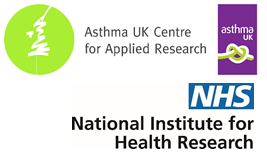IMP2ART
Full Title: Implementing supported asthma self-management in routine clinical care: designing, refining, piloting and evaluating clinical and cost-effectiveness of a whole systems implementation strategy
Chief Investigator: Professor Hilary Pinnock and Professor Stephanie Taylor
Funder: NIHR Programme Grants for Applied Research (NIHR PGfAR)
Funder Reference: RP-PG-1016-20008
Research Status: Set Up
This news bulletin presents independent research funded by the National Institute for Health Research (NIHR) under its Programme Grants for Applied Research Programme (Reference Number RP-PG-1016-20008). The views expressed are those of the author(s) and not necessarily those of the NHS, the NIHR or the Department of Health.
Asthma UK estimates that 5 million people in the UK have asthma; with good management most should be symptom-free most of the time. Despite this 60,000 people are admitted to hospital with asthma each year; many more attend their GP for emergency care. 1,200 people die from asthma each year – many of these deaths are preventable.
Supported self-management, including engaging in the discussions around a personal asthma action plan, helps people adjust treatment in response to worsening symptoms, improves day-to-day asthma control and reduces the risk of asthma attacks. However, fewer than a quarter of people replying to an Asthma UK websurvey said they had an action plan.
We aim to promote a major advance in how asthma is managed in UK primary care so that fewer people have badly controlled asthma. To do this, we need to influence the organisation of primary care asthma management, the skills of healthcare professionals and resources for patients.
In our preliminary work, people with asthma told us how habits, experience and professional advice helped them manage their asthma. General practitioners, nurses and staff explained how they organise asthma care in their practices and discussed the best ways of fitting supported self-management into their routines. Nurses discuss self-management within routine reviews, but lack of time is a problem. They suggested that technological solutions (such as templates; digital action plans) would be useful, but must integrate with their computer systems.
We will now:
1. Prepare and try out a new integrated approach to help practices implement supported asthma self-management, incorporating:
- Organisational strategies to promote change (e.g. audit/feedback, improved computer templates)
- tailored patient resources (e.g. tailored paper/electronic action plans, asthma-relevant information)
- Behavior-change training for nurses/doctors/staff to develop skills
2. Test the approach in a nationwide study.
We will recruit 144 general practices and assign them by chance to either receive the new approach to asthma care or continue with their usual care. A facilitator will visit intervention practices over a year and discuss with them the best strategies for supporting self-management in their practice.
One year after the new strategy has been introduced into practices we will use anonymous data from practice electronic records to assess benefit by measuring how many people needed emergency care for an asthma attack and the cost of providing supported self-management. We will send questionnaires to people with asthma to ask if they have an action plan and measure their asthma control, and interview professionals and patients to help us understand how and why the strategy worked or didn’t.
If successful our strategy and the on-line educational package, experienced facilitators, digital action plans, and review templates, will be immediately ready for roll-out to benefit people with asthma and the NHS